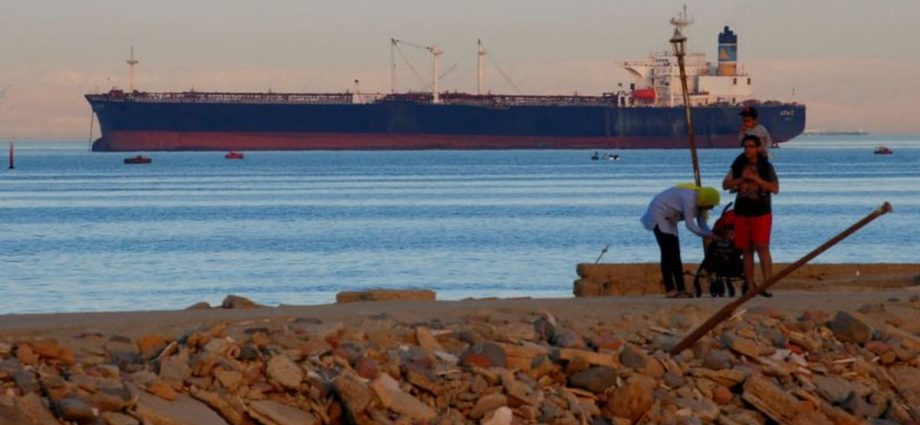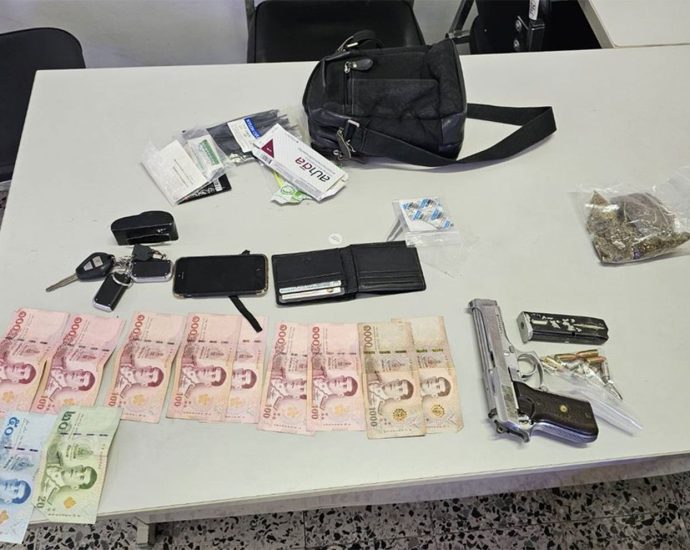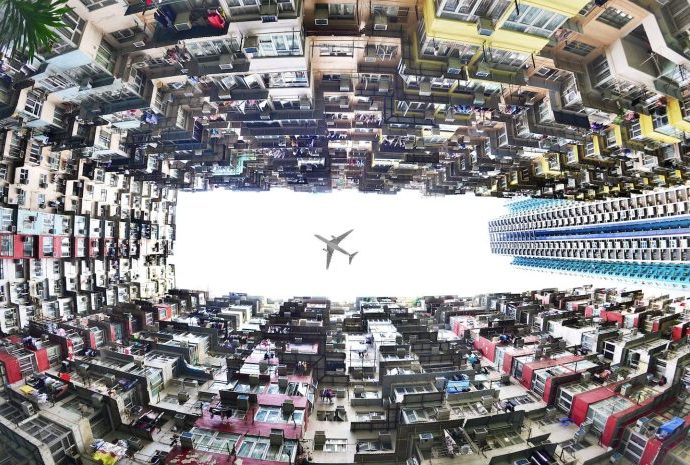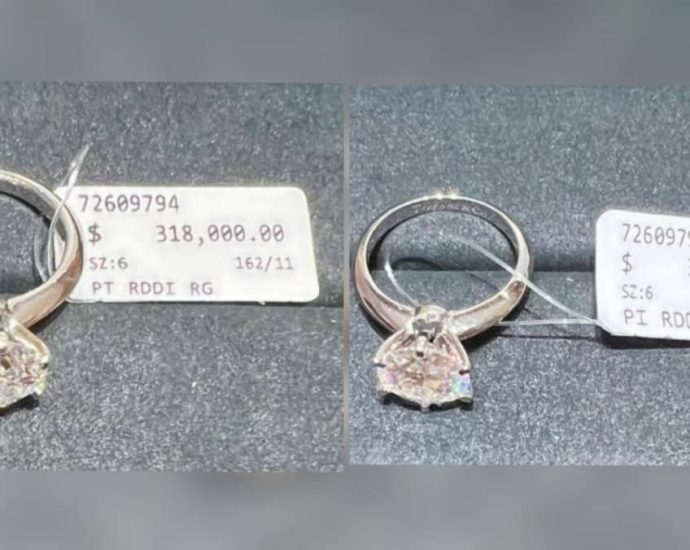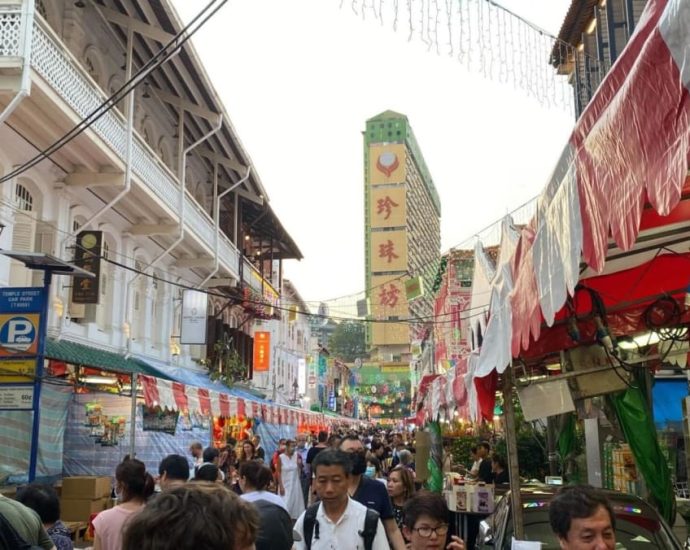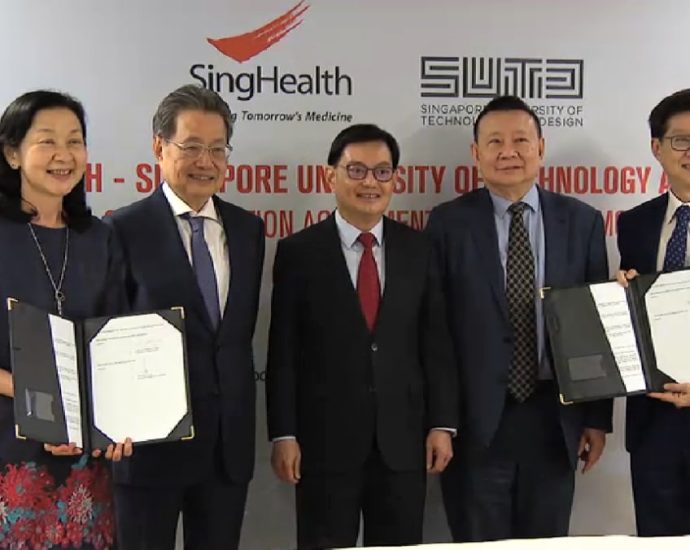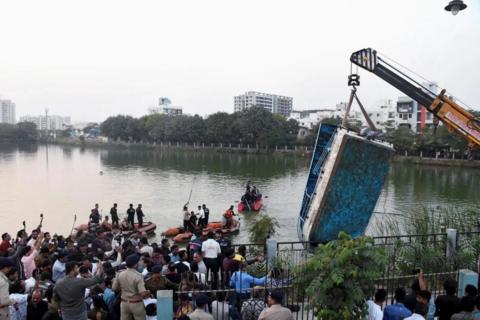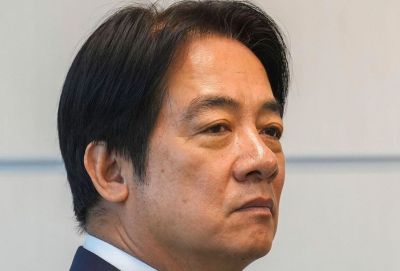China commerce ministry ‘closely following’ Red Sea developments
BEIJING: China’s commerce ministry has said it is closely following developments in the Red Sea, state media reported, after attacks by Houthi rebels on ships in solidarity with Palestinians in Gaza. “It is hoped that the relevant parties will proceed from the overall interests of regional security and stability asContinue Reading
Deputy police inspector arrested for selling speed pills
PUBLISHED : 19 Jan 2024 at 13:13

NAKHON SAWAN: A deputy police inspector at Nong Pling police station has been sent to jail after he was arrested for selling speed pills.
Pol Sub Lt Sutthirat Amphasawet, 55, was arrested while delivering 40 speed pills to a police spy posing as a customer near his police station in Muang district on Monday, according to his boss, Pol Col Wiriyabundit Sathitsuchart, chief of Nong Pling police station.
Pol Col Wiriyabundit said he had ordered an investigation into police involvement in the illicit drug trade after assuming the station police chief post last month. The probe revealed that Pol Sub Lt Sutthirat, deputy inspector in charge of crime suppression, had been selling speed pills for a long time.
The deputy inspector had used areas inside the police station compound to sell illicit drugs, the police chief said.
The ploice chief coordinated with investigators from Nakhon Sawan provincial police office to hold a joint investigation and gather evidence, leading to the arrest of the officer.

Cash used by a police spy to buy speed pills from a deputy police inspector-turned-drug seller and other items are displayed at Nong Pling police station in Nakhon Sawan following the arrest of the officer on Monday. (Photo: Chalit Poomruang)
An extended investigation led to the arrest of three local residents involved in the selling of illicit drugs with 333 speed pills seized from them, said Pol Col Wiriyabundit.
Before the arrest, the arresting team hatched a plan to send a spy to pose as a customer to buy 40 speed pills from Pol Sub Lt Sutthirat for 1,500 baht. The officer then asked the buyer to collect the drugs at a garage near the police station at 2.30pm on Monday. When the drugs were delivered, the arresting team showed up to arrest him while he was walking to work at the station.
Pol Sub Lt Sutthirat was taken for a urine test for drugs and tested positive. A search of his room at a police flat revealed 42 more speed pills.
During questioning, the officer admitted the pills belonged to him. He said he was addicted to illicit drugs and decided to sell speed pills to earn extra income to finance his expenses. He chose to deliver the speed pills in the compound of the police station because he believed it was a safe location.
Pol Col Wiriyabundit said he has ordered the dismissal of the officer from the police force. The officer had been taken to the provincial court and was later sent to prison.
Chinese yuan gaining greater currency in the Gulf – Asia Times
China’s pursuit of internationalizing the yuan, currency swaps, e-currency, cross-border deals and digitalized currency have recently made international news. These efforts are mainly on the rise with Gulf states.
On November 28, 2023, the People’s Bank of China and the Central Bank of the United Arab Emirates renewed their currency swap agreement worth US$4.89 billion for five years. Both banks also signed a memorandum of understanding to enhance collaboration in digital currency development.
Meanwhile, the Dubai Financial Market, in collaboration with Nasdaq Dubai and the Shanghai Stock Exchange, signed a memorandum of understanding covering various areas of digital financial cooperation.
A China-UAE currency swap started in 2012, and in March 2023, the two sides made the first-ever purchase of liquified natural gas in yuan.
On November 20, 2023, the People’s Bank of China and the Saudi Arabian Monetary Authority signed a currency swap of $6.98 billion for three years.
In a separate development, Saudi companies were listed on the Hong Kong Stock Exchange. Saudi Arabia is in active talks with Beijing to price some of its oil sales in Chinese yuan, a move that would dent the US dollar’s dominance in the global petroleum market and mark another shift by the world’s top crude exporter towards Asia.
China also has a currency swap agreement with Qatar. In addition to currency swaps, China has signed cross-border trade settlement arrangements with all six members of the Gulf Cooperation Council and has established yuan clearing centers in different cities. These measures could make the yuan a trade invoicing currency, reduce cumbersome processes and costs and create a pool of liquidity in the yuan.
The growing financial cooperation between China and Gulf Cooperation Council states is not unexpected. It is the result of steady, systematic growth over a decade and confirms deepening bilateral relations.
Both sides have placed a significant premium on the digitalization of their finances. They are taking measures to create greater space and avoid US sanctions. The Gulf region, especially the United Arab Emirates, has positioned itself as a global financial hub and is drawing investments towards it. Saudi Arabia is also striving to catch up quickly.
From the Chinese side, the Belt and Road Initiative and its energy needs pushed it towards the Gulf Cooperation Council. The Belt and Road Initiative’s Action Plan stresses financial connectivity, the internationalization of the yuan, cross-border payment agreements, financial integration and the incorporation of the yuan in the International Monetary Fund’s Special Drawing Rights basket of currencies. China achieved this milestone in 2016.
In line with these goals, China launched the Yuan Cross-Border Interbank Payment System in 2015, providing a stable platform service for cross-border yuan settlement. By early 2023, this payment system boasts 1,366 participants from 109 countries and regions.
Additionally, the People’s Bank of China has entered into currency swap agreements with the central banks or monetary authorities of 29 countries.
China initiated efforts to internationalize the yuan in 2004 and started financial cooperation with the Gulf Cooperation Council a decade later. In 2013, during his meeting with the King of Bahrain, Sheikh Hamad bin Isa al-Khalifa, Chinese President Xi Jinping emphasized the need for closer cooperation with Gulf countries.
Xi reiterated this during his speech at the Arab League headquarters in 2016. Acting upon Xi’s guidelines, Chinese banks and financial institutions expanded their presence, cross-border financial transactions and activities in the Gulf region.
As a result, Chinese banks have more than doubled their balance sheets in the Dubai International Financial Centre since mid-2014. By 2018, their total assets accounted for nearly a quarter of the financial center’s assets. And Chinese financial entities have upgraded their licenses from subsidiary to branch status in the Dubai International Finance Center.
Though these deals are moderate in volume, they demonstrate China’s growing ties with the region. Beijing has institutional mechanisms with the Gulf Cooperation Council and the Arab League.
Saudi Arabia and the United Arab Emirates are set to join the China-and-Russia-led BRICS in early 2024. They are also dialogue partners of the Shanghai Cooperation Organization, with the possibility of achieving full member status in the future.
These financial agreements between China and the Gulf Cooperation Council hold great potential. They could reduce the duration and cost of transactions, mitigate risks, enhance resilience against financial crises, expand market access, promote bilateral trade and facilitate regional integration. They may serve as catalysts, encouraging other Middle Eastern countries to engage in similar deals with China.
Saudi Arabia — as one of the primary oil exporters to China — may consider adopting the yuan for oil trade in the long term, reducing dependence on the dollar. These deals will strengthen bilateral relations and indicate a shift from the petrodollar to the “petroyuan”, albeit over an extended timeframe.
Dr Ghulam Ali is Deputy Director at The Hong Kong Research Center for Asian Studies.
This article was originally published by East Asia Forum and is republished under a Creative Commons license.
Man gets jail for trying to swap S$318,000 diamond ring with replica at Marina Bay Sands shop
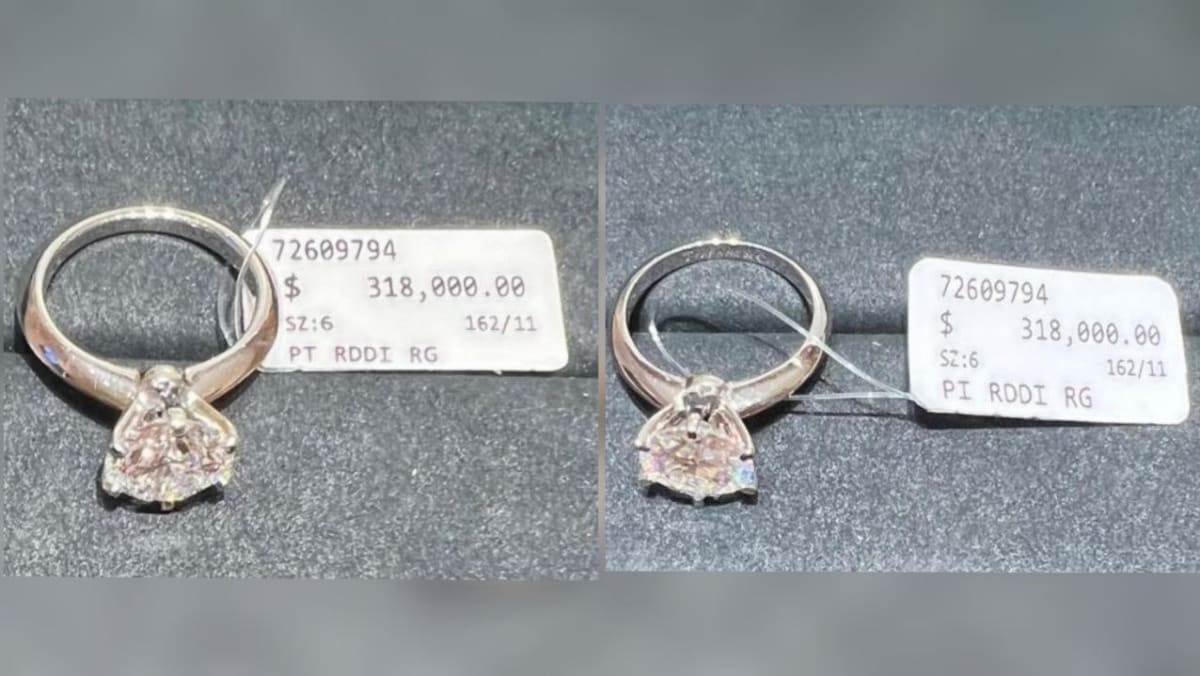
SINGAPORE: In a bid to earn some fast cash, Wu Youquan tried to swap a diamond ring worth S$318,000 (US$237,000) with a replica ring at a Tiffany & Co luxury jewellery store at Marina Bay Sands last year.
Wu did not manage to make it out of the store before an employee discovered what he had done.
On Friday (Jan 19), the 44-year-old Chinese national was sentenced to 40 months’ jail after pleading guilty to a theft charge. Another charge of attempted cheating was taken into consideration for sentencing.
The court heard that a fellow Chinese national, Chen Hanbo, first reached out to Wu on WeChat in October 2023 and asked if he was interested in “fast cash jobs”.
When Wu said yes, Chen told him the job was a high-risk one that involved swapping a genuine diamond ring at Tiffany & Co with a replica one. Chen did not specify how much Wu would earn but reassured him that he would not be shortchanged.
On Nov 1, the pair flew to Singapore and visited the Marina Bay Sands casino.
Chen, who paid for Wu’s travel expenses, then visited the Tiffany & Co store alone to look at a potential diamond ring for the swap. They returned to China on Nov 3.
Six days later, Wu returned to Singapore alone on Chen’s instructions. Chen told him to go to the store, look for the biggest diamond ring there and take a photograph of its price tag.
Wu went to the store and told a client adviser there that he was from Taiwan and looking for a gift for his wife in the form of a “big diamond ring”.
When the employee showed him some, Wu took a photo of a 3.18-carat ring and its accompanying price tag of S$318,000 after seeking permission to do so. He sent the photo to Chen sometime later.
He told the client adviser that he would be returning within the next few days to buy the genuine ring. She gave him her name card and wrote down her working hours on Nov 11, as well as the particulars of the ring.
Wu returned to China the following day. Subsequently, Chen told him that he would send over a replica ring via post.
When Wu received the replica, he told Chen that the “string” was a bit too long in an apparent reference to the string attached to the price tag. Chen said no one would notice this.
SLEIGHT OF HAND
Wu came back to Singapore by himself on Nov 20, with his travel expenses paid for by Chen once more.
He went to the Tiffany & Co store and asked for the client adviser who had earlier attended to him, but she was not there.
A team manager, Ms Pearlyn Tong, attended to him instead. When Wu told her that he was looking for a diamond ring he had previously seen at the store, she showed him various rings of different carats on a tray.
He held onto the replica ring in his pocket before using his other hand to pick up the genuine ring and look at it.
In order to distract Ms Tong, he told her he wanted to look at another ring. While she was opening a nearby drawer, Wu placed the replica back on the tray and pocketed the genuine ring. She did not notice the swap.
Wu then said he wanted to buy another ring so he could find an opportunity to leave the store, before saying he had changed his mind.
Ms Tong realised that the texture of the price tag on the replica felt different. She told Wu that the ring did not belong to Tiffany & Co, but Wu did not respond.
Another employee conducted a check on him and that was when Wu took the genuine ring out of his pocket and asked for their forgiveness. The police were called and he was arrested.
“HIGHLY PREMEDITATED”
Deputy Public Prosecutor Kelly Ng sought at least 42 months’ imprisonment. She told the court that Wu’s crimes were “highly premeditated” and there was a transnational element, with Wu and Chen targeting Singapore for profitable criminal activities.
Wu also stole the ring for his personal financial gain to earn some fast cash, added the prosecutor.
She acknowledged that Wu had no criminal history in Singapore, cooperated with investigations and pleaded guilty at an early stage.
In mitigation, Wu – who was unrepresented – pleaded for leniency and asked the court to consider the fact that he did not remove the genuine ring from the shop.
He also said his family circumstances, including his daughter being paralysed from an accident, were “giving him a lot of stress”. “Hence, I made a mistake by committing this offence,” he said in Mandarin.
For theft in dwelling, Wu could have been jailed for up to seven years and fined.
Chinese New Year bazaar begins in Chinatown, visitors advised to check crowd levels
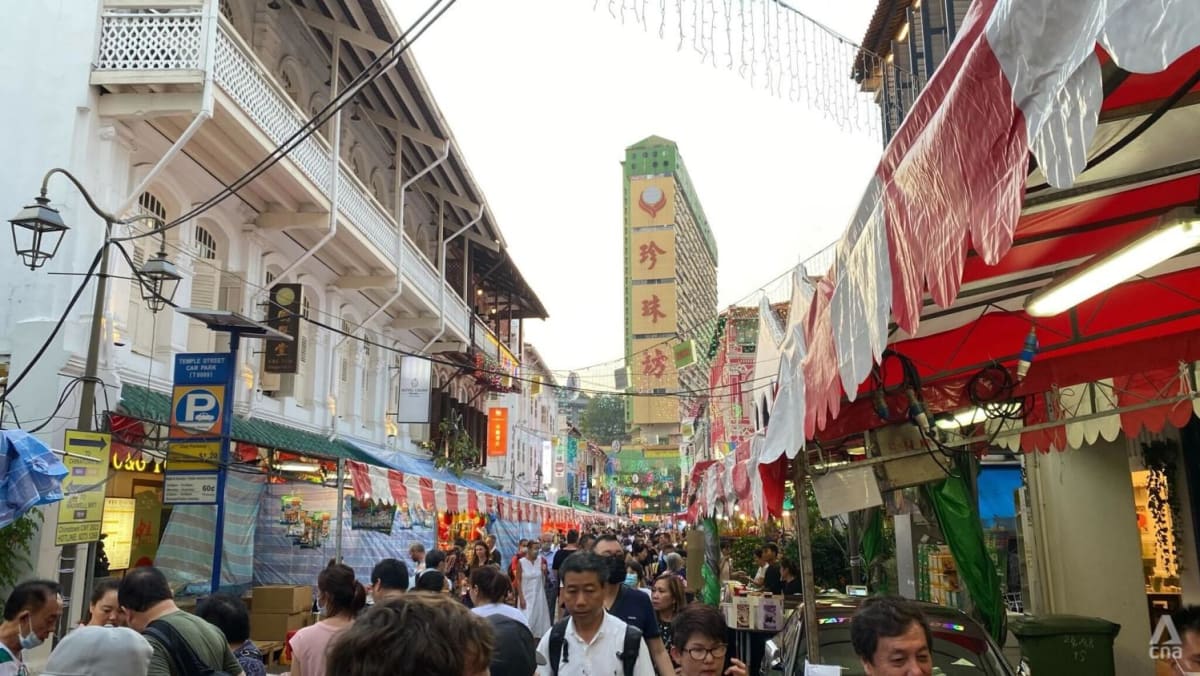
SINGAPORE: Visitors to the Chinese New Year bazaar in Chinatown can expect large crowds on some days and potential road closures.
The bazaar will take place from Friday (Jan 19) to Feb 9, the eve of Chinese New Year.
On the weekend before Chinese New Year in particular – between Feb 2 and 4 – those planning to head down are encouraged to check real-time crowd levels first using the Crowd@Chinatown map.
“For crowd safety, diversions to access the bazaar may be implemented. If crowd safety thresholds are reached, specific areas will be locked down,” said the police in a media release on Friday.
“Members of the public are advised to be patient and follow the instructions of officers. They should not push or attempt to force their way into crowded or closed-off areas.”
The Crowd@Chinatown map can be viewed on computers and mobile devices. It will be available from 6pm on Feb 2 to Feb 4. People should avoid the areas marked red on the map and move towards the amber or green areas.
As Chinatown MRT station is expected to be crowded, commuters are advised to consider using Maxwell MRT station.
Police, auxiliary police officers and security officers will be deployed to Chinatown to manage crowds and ensure safety.
The police also reminded people to remain vigilant against the risk of pick-pocketing or molestation.
Seniors in Bedok South and Marine Terrace to get more support in healthy ageing under project
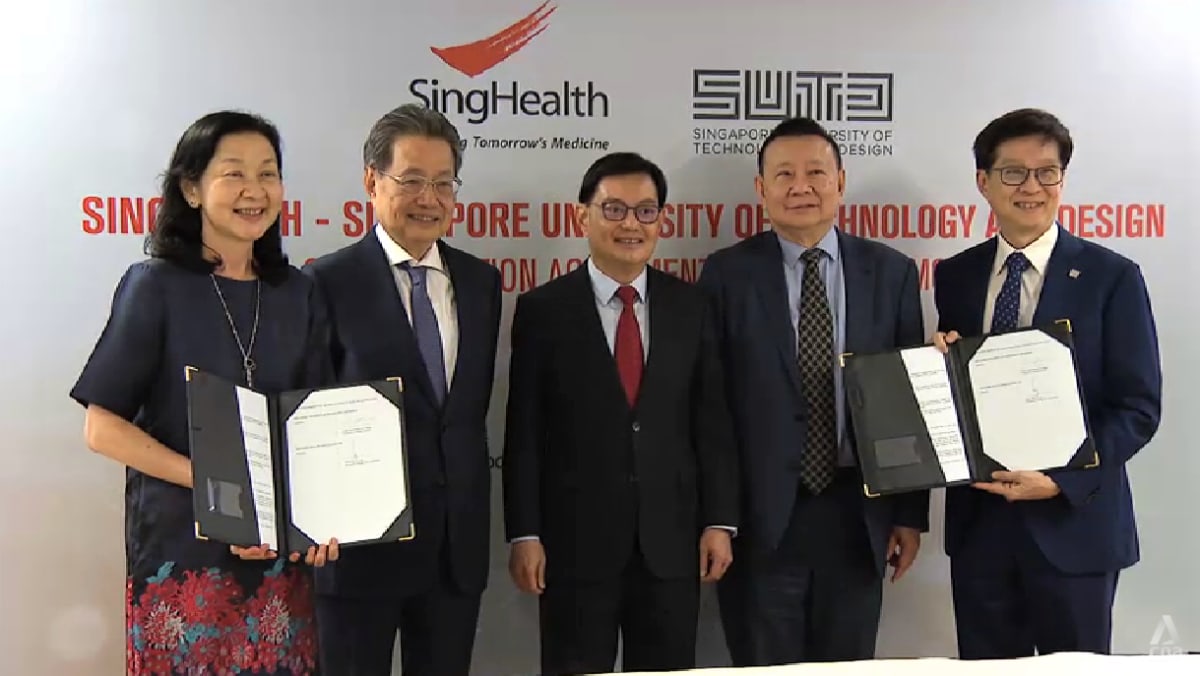
ENABLING ACTIVE, HEALTHY AGEING
These include improving senior-friendly facilities and having nurses stationed at ageing centres, efforts which are increasingly important in Singapore’s greying population.
The project will also look at designing infrastructure catered to seniors.
Studies will be conducted to find out how these efforts can lead to better quality of life and health.
The goal is to bring the project to estates such as Chinatown and Bukit Merah in future.
At a ceremony held at Changi General Hospital to mark the expanded partnership between SingHealth and SUTD, Deputy Prime Minister Heng Swee Keat said enabling active and healthy ageing requires various interventions.
These include tapping new technologies to monitor seniors’ health, and modifying homes and public spaces to be more senior-friendly.
“Taken together, these interventions in population health will benefit not only the seniors, but also alleviate the burden on caregivers as the number of seniors grows,” said Mr Heng.
“The wide range of intervention means that different sets of expertise will be needed to execute as well as integrate them. Partnerships, between stakeholders and across sectors, will be essential, to enable us to take a citizen-centric approach to delivering services.”
In Singapore and many other countries, people are ageing rapidly, he added.
“Singapore is one of the fastest ageing societies globally and will soon be a ‘super-aged’ society,” he said.
In 2010, only one in 10 Singaporeans were aged 65 and above. Today, that number has almost doubled to one in five Singaporeans. By 2030, it will be nearly one in four.
“This demographic trend has significant social and economic implications for us,” Mr Heng noted.
“We are already rethinking our workforce, our economy, and our provision of healthcare to adapt to an ageing population.”
Free NETS FlashPay card exchange at SimplyGo ticket offices ‘temporarily unavailable’ until further notice
SINGAPORE: A free exchange service for those looking to swap their NETS FlashPay cards for the NETS Prepaid Card is “temporarily unavailable” until further notice. The exercise at SimplyGo ticket offices was initially scheduled to begin on Friday (Jan 19) and run until Jul 18. NETS announced on Facebook last week thatContinue Reading
Vadodara boat accident: India schoolchildren were ‘not given life jackets’
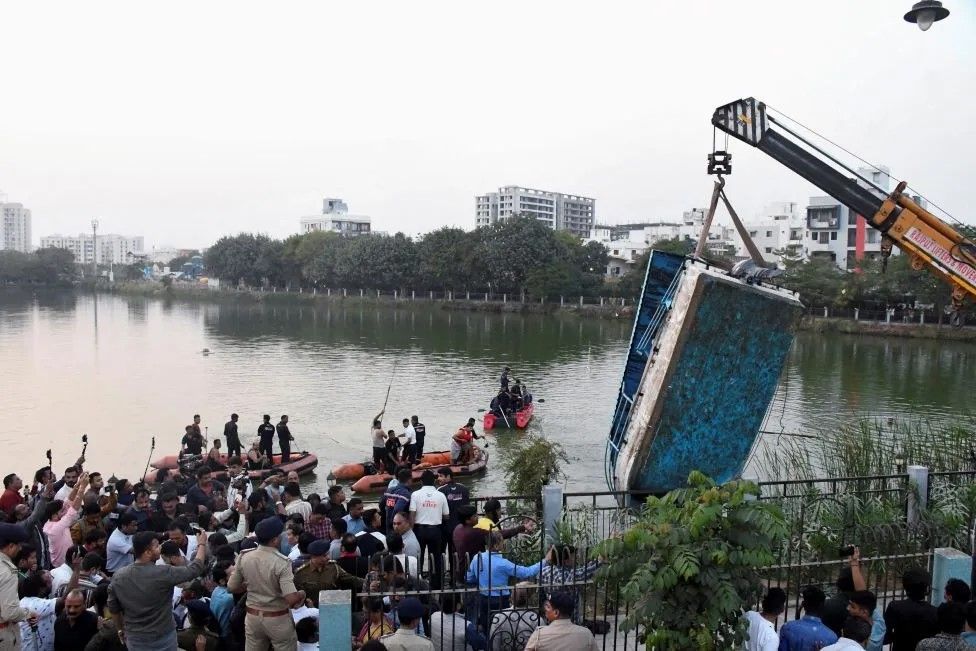 Reuters
ReutersParents of school students who were on the boat that capsized in a lake in India’s Gujarat state have alleged that their children were “not given life jackets”.
Twelve pupils, aged between seven and 12 years, and two teachers, drowned in the incident on Thursday in Harni Lake in Vadodara city.
Police have arrested two people in connection with the incident.
Search operations are underway to find the remaining victims.
Eighteen students and two teachers have been rescued so far and are undergoing treatment in a nearby hospital, authorities say.
While the cause of the incident is not yet known, eye witnesses say that the boat was packed beyond its capacity of 14 passengers.
The tragic incident has made national headlines, and many parents have accused the authorities of jeopardising their children’s lives by flouting safety norms.
Asma Sheikh, a relative of a rescued student, told BBC Gujarati that despite being told about a picnic and boat ride, school authorities allegedly did not provide life jackets to the students.
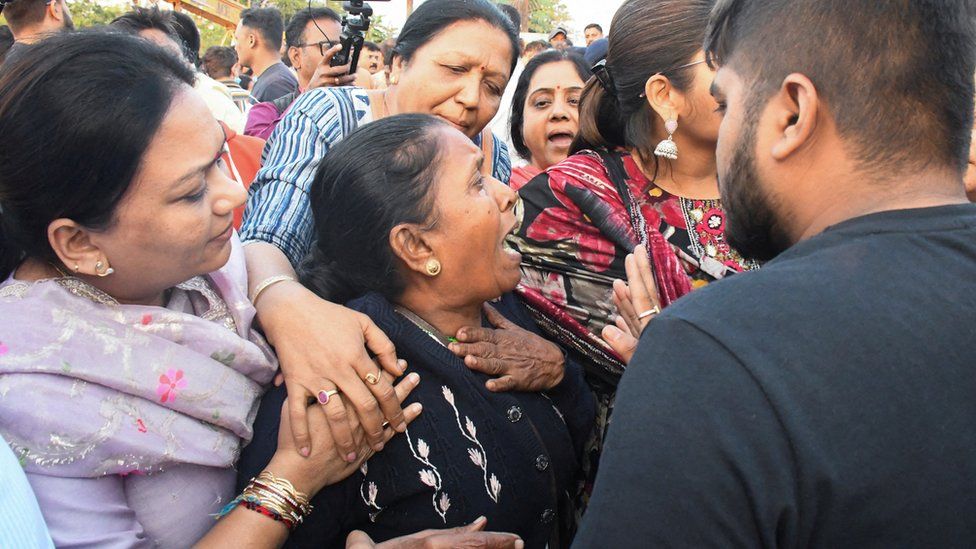
Federal minister Harsh Sanghvi said that only 10 students on the boat were wearing a life jacket, which means that a majority of the passengers were without one.
When BBC Gujarati visited the accident site on Thursday, several parents had gathered near the lake. Many of them questioned why students were allowed to board the boat without adequate safety gear.
“This [incident] is the result of negligence…it has the direct responsibility of the system, the government and the school,” one parent said.
Some parents have alleged that they were not informed about the boat ride, and the incident.
Naushin Gandhi, sister of one of the students who died, told The Times of India newspaper that the school had informed them that the students were going to be taken to a water park, but then took them to a lake instead.
“Since the tragedy, I desperately tried to contact the school authorities but nobody responded,” she alleged.
Some parents alleged that such incidents, which result from the negligence of Gujarat authorities were happening “frequently”.
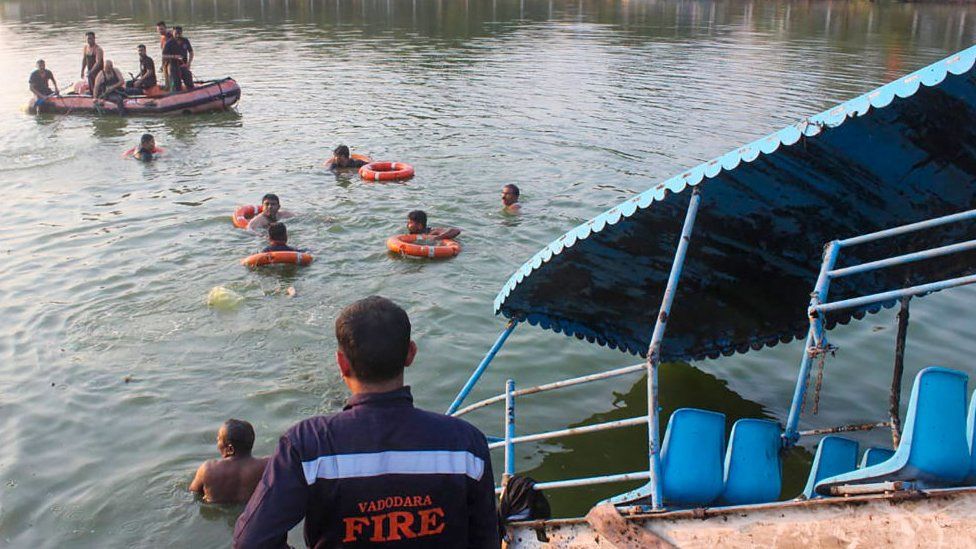
In October, at least 135 people died after a pedestrian suspension bridge collapsed in Morbi.
Mr Sanghvi has blamed the operator of the boat and contractor for the latest incident and said that it cannot be called a “mistake”.
The Gujarat government has ordered an inquiry into the incident and has sought a report within 10 days.
According to local media reports, about 80 students from New Sunrise School had gone on the picnic, and while some students went on the boat ride, others were engaged in other activities.
An official told BBC Gujarati that the boat began to tilt because there was an issue with its “balance” and then tipped over.
Boat accidents are not uncommon in India, where vessels are often overcrowded, poorly maintained and lack safety equipment.
Last year, 22 people died after a boat capsized in India’s southern Kerala state.
BBC News India is now on YouTube. Click here to subscribe and watch our documentaries, explainers and features.

Read more India stories from the BBC:

Xi’s Taiwan rhetoric backfired at the ballot box – Asia Times
Chinese officials tout “Xi Jinping Thought on Diplomacy” as “epoch-making” and praise the “great insight” of Xi’s “Global Security Initiative.” When it comes to Taiwan, however, Xi appears stuck with a misguided and failing policy as underscored by the results of the island’s January 13 elections.
China’s policy holds that Taiwan must subordinate itself to the Chinese Communist Party (CCP) government in Beijing, handing over control of its foreign relations. Until this happens, the PRC will inflict pain through military pressure, economic coercion and restriction of Taiwan’s international privileges.
In the latest example, Nauru announced on January 15 that it would sever diplomatic relations with Taipei and recognize Beijing. The PRC presumably engineered the switch as a reaction to Taiwan’s voters selecting the presidential candidate least preferred by Beijing.
If it determines that voluntary unification has become impossible, China will go to war to forcibly annex Taiwan. PRC officials continue to say they will implement in Taiwan the same “one country, two systems” principle under which Hong Kong authorities are now imprisoning peaceful protestors, including some who merely stood outside holding blank pieces of paper.
Apparently thinking it would sweeten the deal, China’s ambassador to France said in 2022 that, after unification, China would carry out “re-education” in Taiwan. This “choose me or I’ll kill you” approach had a predictable counterproductive influence on Taiwan’s elections.
There was considerable unhappiness in Taiwan with the relatively anti-China Democratic Progressive Party (DPP). The opposition accused the DPP leadership of corruption and suppression of dissent. Young adults are disillusioned with the government’s failure to make housing more affordable. The supply of electricity has become unreliable because of the DPP’s controversial aversion to nuclear power.
Many Taiwan citizens strongly support the principle that no one political party should monopolize governance, and the DPP has held the presidency for the last eight years.
Despite these headwinds, current Vice President Lai Ching-te, the DPP candidate, won the presidential election, largely on the strength of the DPP’s anti-China stance.

Both the PRC government and Taiwan’s other large political party, the Kuomintang (KMT), argued that voting for Lai and the DPP was tantamount to voting for war. But Lai’s victory indicates this argument did not sufficiently persuade Taiwan’s voters that drawing closer to China would increase their security.
Surveys of public opinion on Taiwan show overwhelming, and increasing, support for two ideas:
- First, most of Taiwan’s people identify as “Taiwanese” rather than “Chinese.” They see themselves as a distinct nationality with a different political culture from that of mainland Chinese.
- Second, they want the status quo of a de facto but not de jure independent Taiwan to continue indefinitely. Beijing exercises no authority over Taiwan, but Taiwan continues to honor the Republic of China constitution, which stipulates links to mainland China.
The KMT proposed seeking peace with China through dialogue, economic integration and affirming that Taiwan is a part of China.
Lai and the DPP maintained that closer economic links with China would endanger Taiwan’s autonomy and put at risk its civil liberties. Instead, they called for economic diversification away from China, more robust military defenses, and closer relationships with the United States and other democracies to protect Taiwan from takeover by the PRC.
The presidential election result suggests Taiwan’s people believe that the political costs of further economic entanglement with China are outweighing the financial benefits. They also appear willing to endure continued cross-Strait tensions as the price of maintaining their identity and freedoms.
These outcomes are the exact opposite of what Beijing wishes its policy would achieve.
Framing the issue
The foundation of policy-making is rhetorical construction – how political elites frame an issue. Inevitably, any framing includes certain assumptions.
Erroneous assumptions lead to bad policy. There are many historical examples.
Japan wrongly assumed in 1941 that America was such a decadent and flaccid society that a sudden and successful strike against US military power in the Pacific would cause Washington to accede to a Japanese sphere of influence in the Asia-Pacific region.
Instead, the US immediately committed itself to fighting a war to roll back the Japanese empire and uproot Japan’s government and political system.
During the Cold War, the US military attempted to prevent the Vietminh from taking over South Vietnam based on fears that a shared communist ideology would make Vietnam a puppet of China and that the communization of Vietnam would lead to the same result in Thailand and Japan.
Today, however, Thailand and Japan remain US allies, and the ruling Communist Party of Vietnam government seeks US assistance to resist Chinese domination.
China’s current policy toward Taiwan is based on three questionable assumptions.
First, Xi has specifically said the “great rejuvenation of the Chinese nation,” defined as Chinese achieving a high material standard of living and acquiring sufficient military power to protect the country from molestation by foreigners (the old idea of “rich country, strong army”), cannot be complete without China’s “reunification” with Taiwan.
This is untrue. Taiwan’s being de facto independent has not prevented the standard of living of mainland Chinese from rising dramatically in recent decades. Nor has an autonomous Taiwan interfered with the PRC bulking up militarily to the point where no country wants to fight China. The argument works only as a syllogism: not controlling Taiwan is a threat to China’s security if Taiwan is defined as Chinese territory.
In a second flawed assumption, Xi and other PRC officials say the problem is not “Taiwan compatriots,” but rather “outside forces and the few separatists.” Blaming foreign agitation for political unrest is a common theme in official PRC commentaries about Xinjiang and Hong Kong, and Beijing applies it to Taiwan, also.
But this narrative seems willfully ignorant of the public opinion surveys in Taiwan indicating that strong and rising majorities do not self-identify as “Chinese” and never want Taiwan to politically unify with China.
Finally, the official PRC position, summarized in a 2022 Chinese government white paper, asserts as an “indisputable fact” that “Taiwan has belonged to China since ancient times.” This “fact,” however, is quite disputable.

Taiwan’s indigenous inhabitants are not ethnically Chinese. In pre-modern times, Chinese governments saw Taiwan as barbarian territory and as a haven for pirates and political dissidents. The rulers in Beijing wished Taiwan didn’t exist. Spain and Holland controlled parts of the island in the 1600s. China’s Qing Dynasty government annexed Taiwan in 1684 mainly to prevent its use as a rebel base.
Taiwan was a Japanese colony for the 50 years prior to the end of World War II. Mao Zedong himself supported independence for Taiwan while it was under Japanese occupation, changing his position only after the rival KMT government claimed sovereignty over Taiwan during the 1943 Cairo Conference.
With the KMT’s defeat in the Chinese Civil War and expulsion from the mainland, Taiwan became the seat of the Republic of China government. The CCP regime has never ruled Taiwan.
The most objectionable part of Beijing’s claim to sovereignty over Taiwan is that it disregards the principle of self-determination. The vast majority of Taiwan’s people don’t want to be PRC subjects. Asserting a right to seize a country against the will of its inhabitants seems an anachronism in the 21st century.

Xi inherited what has become a disastrous rhetorical framework – not only misconceived but continuously and widely reiterated through the Chinese education system and media. Today it entraps the CCP leaders.
They have, in effect, proclaimed that they are not worthy to rule if they “lose” Taiwan. According to a Taiwan media report, when Xi met with KMT leader Hung Hsiu-chu in 2016, he expressed the fear that “the Communist Party would be overthrown by the people” if his government failed to stop Taiwan from becoming formally independent.
The PRC’s current approach to Taiwan not only deepens the conviction of Taiwan’s people that they never wish to be ruled from Beijing; it also potentially obligates Chinese leaders to start a war even if they do not believe they can win.
As formidable as the Chinese armed forces have become in recent years, it is far from certain the PRC would win a cross-Strait war against probable US and very likely Japanese intervention.
Credible simulations run by the Center for Strategic and International Studies in Washington in 2022 found that both US and Chinese forces would suffer heavy losses; China would devastate – but fail to conquer – Taiwan; and the CCP would be in danger of ouster at home.
How to escape the trap
Both inside China and externally, the PRC leadership could and should begin to dismantle its rhetorical construct of the China-Taiwan relationship.
If it should wish to do so, the Chinese government could aim for something akin to the relationships between other pairs of states with large communities that share culture and ethnicity, such as the United States and Canada, Australia and New Zealand or China and Singapore.
Substantively, a new narrative could discontinue China’s claim to owning Taiwan. Instead, it could emphasize points such as these:
- China recognizes that current political and legal arrangements are the result of historical events and will take a long time to settle.
- Regardless of these circumstances, much of the population of Taiwan is unalterably “Chinese” by way of ancestry and culture.
- China therefore supports and celebrates Taiwan’s successes as Chinese civilizational success.
- China welcomes additional cooperation with Taiwan, and confidently looks forward to demonstrating to Taiwan the benefits of closer integration.
This would flip the game to China’s advantage, with positive spillover effects in China’s relationships with the US and other countries.
Alas, Xi seems either unwilling or unable to escape from the trap his party manufactured.
Reports in early 2023 said Xi had assigned CCP ideologue Wang Huning to formulate a new principle for China’s Taiwan policy to replace “one country, two systems.” A year later, Beijing has not announced even a superficial change in a Taiwan policy that serves the PRC so badly.
Denny Roy is a senior fellow at the East-West Center, Honolulu.
Jail, caning for man who tried to rape drunk friend after night out, molested her on the way to his home
SINGAPORE: A 39-year-old man who attempted to rape his intoxicated friend, 29, at his home after a night out with friends was handed four years and six months’ jail and three strokes of the cane on Thursday (Jan 18). He also molested the victim in a taxi on the wayContinue Reading

